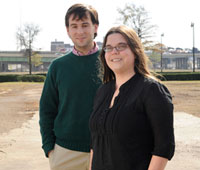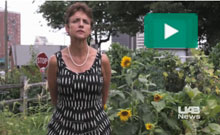UAB Focuses on Food Security
By Glenny Brock
 |
David Buys and Heather Lee are part of a campuswide effort to educate students and the Birmingham community on ways to improve "food security," or access to healthy foods. |
Viewed from above, Birmingham’s urban landscape reveals plenty of office buildings, parking decks, retail centers, roads, and houses. What you won’t see, in certain parts of town, are grocery stores. Instead, you’ll spot convenience stores, often sandwiched in between two or three competing fast-food franchises. These are “food deserts,” the increasingly common term for urban districts whose residents lack access to fresh, healthy food.
Birmingham has dozens of food deserts, but solutions are beginning to take root. In addition to more than two dozen community gardens across the metro area (many of which are located at schools and churches in low-income neighborhoods), a network of farmers markets, food-recovery programs, community-development organizations, and local business groups are working on issues of food security, which the U.S. Department of Agriculture defines as “access by all people at all times to enough food for an active, healthy life.” According to a 2008 report from the agriculture department, 13.3 percent of households in Alabama don’t meet that definition.
Until now, UAB’s role in the local “food justice” movement has been almost entirely research-based. But according to David Buys, a Ph.D. candidate and graduate assistant in the UAB medical sociology program, that dynamic is changing with the launch of the UAB Hunger and Food Security Initiative (HAFSI). “It’s about bringing together community work and course work, activism and research,” Buys says.
Growing Knowledge
Working with Norma-May Isakow, director of the UAB Office for Service Learning, and Heather Lee, program coordinator of the Sparkman Center for Global Health at the UAB School of Public Health, Buys helped HAFSI get off the ground earlier this year. The campuswide effort aims to educate students and the community about food security through curricular and extracurricular activities. On November 11, David Beckmann, president of the Alliance to End Hunger and the World Food Prize Laureate for 2010, visited UAB to give a talk titled “Every Student Has a Role in the Fight Against Hunger.”
Isakow explains that food security is an ideal topic for interdisciplinary collaboration, a UAB hallmark. “The focus of my job has been to increase the visibility of service-learning pedagogy, but in the past, there has been no real cohesion among the different disciplines,” Isakow says. “Food security seems like a natural focus for service learning because it relates to every discipline.”
 |
Norma-May Isakow explains how food security has become a primary focus of service-learning efforts at UAB. |
“Food security is biology, political science, economics, education, and even engineering,” Buys says. “Our challenge is to determine how we engage the campus community and push that engagement into the larger community.”
Food for Thought
Lee believes that learning about food-security issues—particularly by doing hands-on work in the community—has the potential to affect the way students eat and think about food. “Once you start thinking about it,” Lee says. “you start asking, 'Where does my food come from? Who is involved in the food production? Who benefits from the massive agricultural subsidies? Why don't grocery stores open up in certain neighborhoods?’ These are all social-justice issues that aren’t necessarily restricted to food security.
“The whole point is to question why things are the way they are and how we can make systems more equitable for people,” Lee says. “Every student has a role to play in improving food security locally and globally, no matter what discipline he or she studies.”